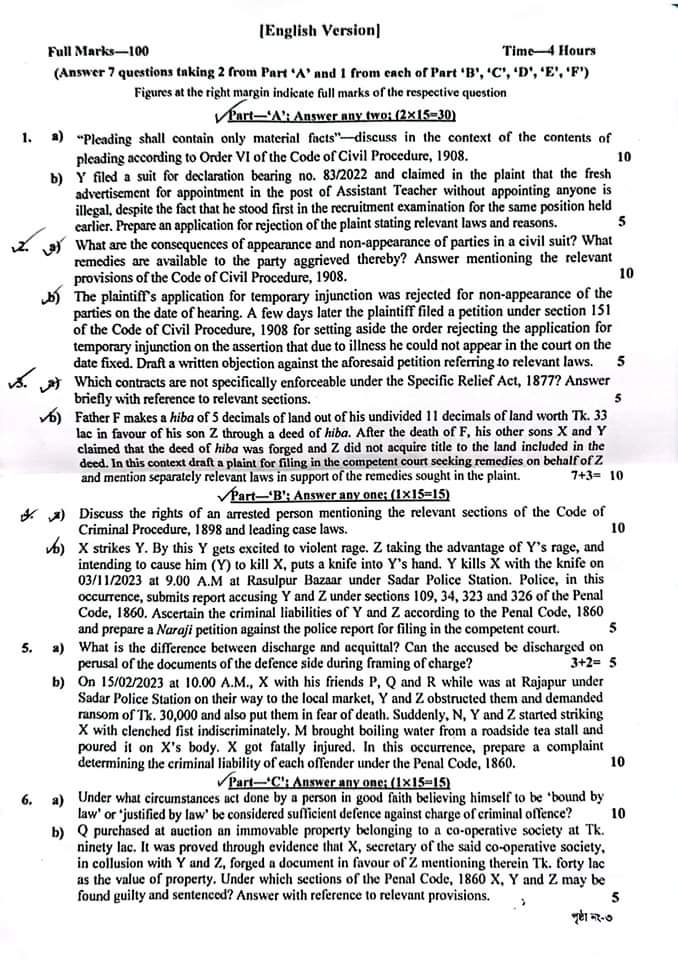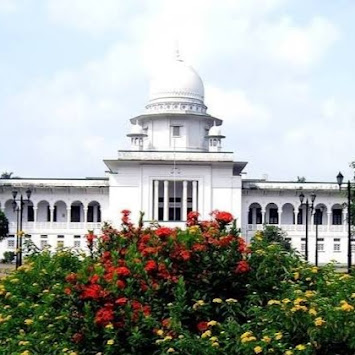Why Bangladesh Needs Constitutional Reform to Ensure Meaningful Judicial Independence?
Keywords: Judicial Independence, separation of powers, Checks and Balances, Constitution of Bangladesh
In democratic governance, the separation of powers is crucial for ensuring accountability, transparency, and justice. The Constitution of Bangladesh, adopted in 1972, envisioned an independent judiciary free from executive interference. However, subsequent amendments, particularly to Articles 98, 115 and 116, have undermined this ideal. Today, there is an urgent need for a constitutional amendment to restore a meaningful separation of powers and ensure judicial independence.
The framers of the Constitution intended a judiciary that would operate autonomously. Originally, Article 115 empowered the judiciary by stipulating that the President appoint district judges based on recommendations from the Supreme Court. Article 116 granted the Supreme Court’s authority over the posting, promotion, and discipline of judicial officers, ensuring impartiality and fostering public confidence in the legal system.
However, amendments have significantly altered these provisions. The current Articles 115 and 116 grant the President and by extension, the executive control over judicial appointments and administration. Although the Constitution requires consultation with the Supreme Court, the final decisions on appointments, postings, and promotions rest with the executive. This overlap introduces executive influence, compromising the judiciary's independence, especially in lower courts.
This concentration of power within the executive has serious implications. The lower judiciary, intended as an impartial check on power, is now vulnerable to political interference. Judges might face pressure to rule in favor of the government to avoid punitive transfers or stalled promotions, eroding public trust and undermining the judiciary's effectiveness as a check on executive overreach.
Several constitutional provisions exacerbate this issue. Article 48(3) requires the President to act on the advice of the Prime Minister, placing control over judicial appointments in the hands of the executive and limiting judicial independence. While Article 109 grants the Supreme Court superintendence over subordinate courts, this authority is weakened by executive control over appointments and discipline.
The landmark Masdar Hossain case highlighted these concerns. The Supreme Court’s Appellate Division issued directives to ensure judicial autonomy and noted in paragraph 76 that “If the Parliament so wishes, it can amend the Constitution to make the separation more meaningful, pronounced, effective, and complete.” This underscores the need for more comprehensive reforms to fully separate the judiciary from the executive.
To restore a meaningful separation of powers, a constitutional amendment is essential. The current framework allows excessive executive influence over the judiciary. Reinstating the original 1972 provisions of Articles 115 and 116, which empowered the Supreme Court to recommend judicial appointments and control postings, promotions, and disciplinary matters without executive interference, would be a crucial step. This would remove undue influence and restore balance of power to the judiciary.
Additionally, Article 48(3) should be amended to limit the executive’s authority over judicial appointments. The President should act independently on matters concerning the judiciary, creating a more transparent, merit-based process for appointments, free from political considerations.
Furthermore, provisions should be introduced to protect judges from arbitrary transfers or punitive actions for decisions unfavorable to the government. Establishing clear guidelines for promotion and discipline of judicial officers and creating an independent oversight body could ensure these processes are transparent and free from political influence.
Article 98 of the original Constitution also played a critical role in preserving judicial independence. It stipulated that the President could appoint additional Supreme Court judges only after consulting the Chief Justice, reinforcing the judiciary’s input in the appointment process. However, the current framework allows the President to appoint additional judges if “satisfied” that it are necessary effectively under the Prime Minister’s guidance. This disregards the original intent of Article 98 and introduces further executive control into the judicial process. Reverting to the original provision, which involved greater judicial input, is essential for maintaining court independence.
Articles 95 and 98 also warrant examination. Article 95(1) states that the Chief Justice shall be appointed by the President, with other judges appointed by the President in consultation with the Chief Justice. Article 98 allows the President to appoint Additional Judges temporarily. While these provisions establish a framework for appointments, they are subject to executive influence due to the broader control the executive has over the judiciary.
This system gives the executive excessive control over judicial appointments and functions. Although the President formally appoints judges, this is done under the advice of the Prime Minister (Article 48(3)), making it a de facto executive-controlled process. This undermines the judiciary's autonomy, even at the highest level, as political considerations can compromise the independence of judges.
These reforms are essential for maintaining the rule of law and preventing the judiciary from becoming subservient to political interests. In a democratic system, an independent judiciary is vital for safeguarding citizens' rights and upholding the Constitution. Without such independence, the judiciary cannot effectively check executive power, skewing the balance of power within the government.
The need for a constitutional amendment to restore judicial independence is more pressing than ever. By reinstating the original provisions of Articles 98, 115 and 116, limiting executive control over judicial appointments, and establishing safeguards for judicial officers, Bangladesh can ensure a balanced, transparent, and accountable governance system. These reforms would not only restore judicial independence but also strengthen public trust in the legal system and reaffirm Bangladesh’s commitment to democratic principles.
The separation of powers is a cornerstone of democratic governance. Without a judiciary free from executive interference, the rule of law cannot prevail, and justice remains elusive. A constitutional amendment to restore the original 1972 provisions and eliminate undue executive control is urgently needed to establish a truly independent and effective judicial system in Bangladesh. The Masdar Hossain case has provided a framework for these reforms, and it is time for Parliament to act decisively to make judicial independence a practical reality.






